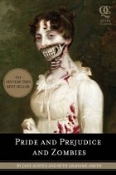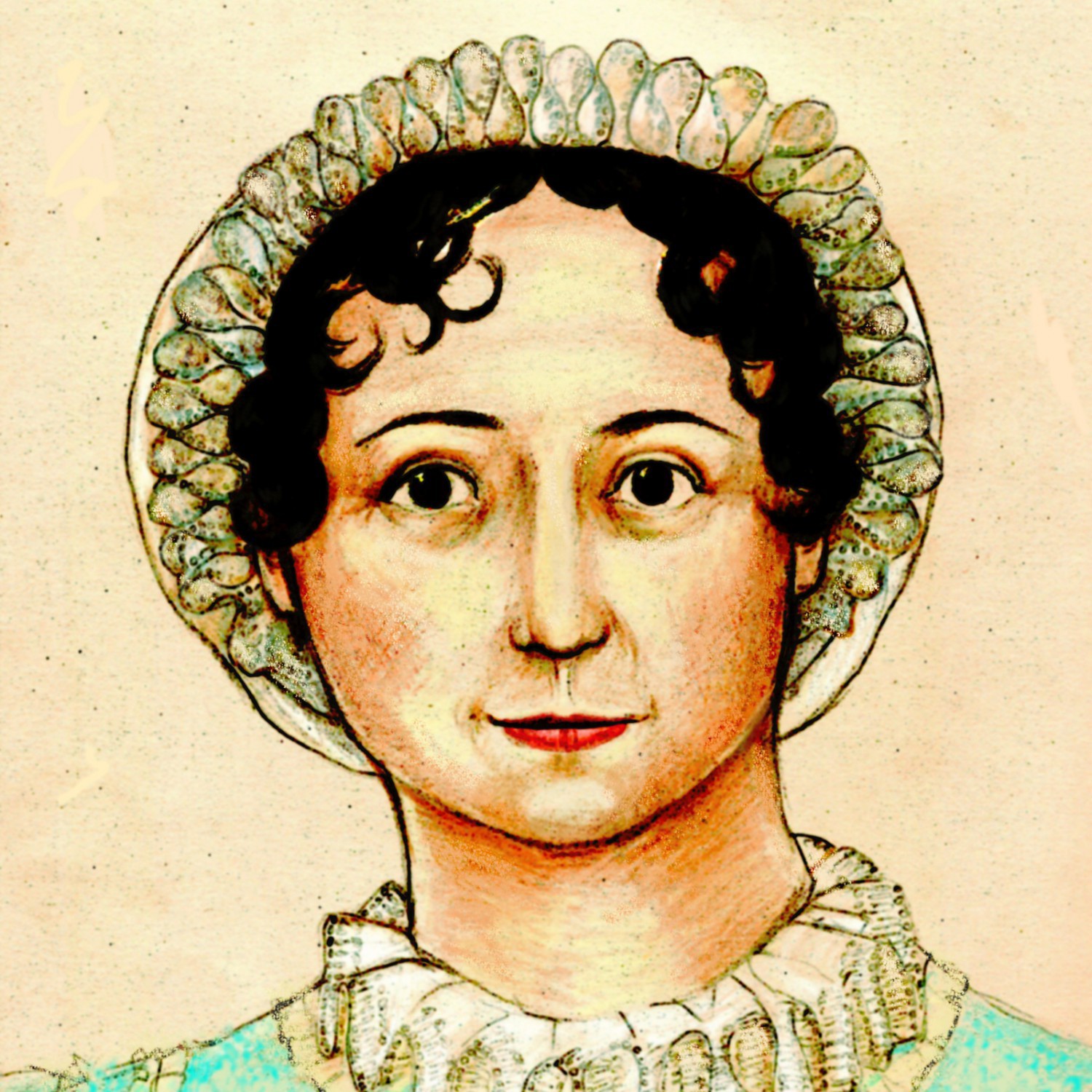 Review by Cynthia Kartman
Review by Cynthia Kartman
Mr. Seth Grahame-Smith
Los Angeles, California
Tuesday 16 June 2009
Literary Pantheon, The Great Beyond
Universe, Known and Unknown
Dear Sir,
It has come to my attention that you have used my book, Pride and Prejudice, as the basis of your new book, Pride and Prejudice and Zombies, published in April of this year.
All of us here in the Pantheon are surprised and many of us not a little jealous that you, by modifying one of our works, have made the enormous sums of money that eluded us in our earthly lifetimes. Mr. Dickens, in particular, is distressed; anything touching royalties sets him off. One might think that we would be beyond jealousy here; but sadly, it is a truth pantheonistically acknowledged that there is no such place in the universe.
I have read with the keenest interest the many interviews, press articles, publicity, reader comments and blogs associated with this book. (Are you surprised? Where exactly did you think “out in the ether” was anyway?) I surmise that your publisher determined a “mash-up” of a literary classic should be done quickly. He liked the title Pride and Prejudice and Zombies, decided upon that, and gave the assignment to you. (What mixture of homage, lack of imagination, greed, and sheer laziness prompted these decisions I am not prepared to say.) Leaving my work comparatively intact, you used Word to cut and paste into the text scenes of your own invention with zombies and zombie-related action sequences.[ 1 ] In other words, you took my living work, one that has been beloved for nearly two hundred years, chewed it up, spit out a few parts here and there that weren’t to your taste, and turned it into a zombie. My heartiest congratulations on the success of your endeavor and my heartfelt hopes that you continue to reap the rewards so much effort merits.
The audience for your book seems to fall into four categories:
1. Those who love P&P who also love zombie/vampire lore. They were eager for the book to be well written and successful.
2. Those who love P&P and, while ambivalent about the mash-up aspect, are keeping an open mind.
3. Those who love P&P and are outraged that it has been tampered with in this way.
4. Those who hate P&P but like zombie tales. The fourth category, in turn, divides into two subcategories: those who are looking forward to a medium that finally makes P&P palatable; and those who are looking for your work to vindicate their long-held belief that P&P is the most overrated book in the English language.
The vehemence of some of those in the fourth category I confess surprised me a great deal. I have not been unaware that, as my stature as an author has grown, there has been a backlash against my work. But it seems there are legions of people who not only hate my work but also feel compelled to bring all others into agreement with their point of view. They write passionately of having been forced to read P&P or some other of my novels in high school, a college English class, or even graduate school. I do indeed sympathize with those who have had my works crammed down their unwilling throats, and I hope someday, when their anger has passed, they can look at my novels again. To the extent your silly book facilitates this, I offer my humble thanks. If the insertion of “bone-crunching zombie action” into Pride and Prejudice in some way alleviates their misery, then I cannot but be glad. Judging by their comments, though, the effects on some of them are indelible, and I suggest they get some kind of professional help immediately. Moreover, I have grave doubts (if you will excuse so obvious a pun) that many of the number so traumatized are likely to develop a new-found appreciation for Pride and Prejudice based upon your book. To re-borrow and paraphrase[ 2 ] the words I gave to Edmund Bertram when he reprimanded Mary Crawford for avoiding public worship, do you think people who cannot figure out the humor and irony in Pride and Prejudice on their own because it is “hard to read” are more likely to understand it when a sufficient quantity of blood and sex are thrown in? I admit, though, that I am curious what kind of student thinks he or she can be admitted to any English grad school program without having to read at least one of my novels. I am bold enough to suspect it is one too stupid to appreciate my work anyway, and I know for a fact it is one whose grammar is appalling. So for that particular writer’s lament I have no sympathy, and of it I am, to say the very least, dubious.
I have of course read the book myself. Indeed, it is not without merit. Your vision of the changes to Regency England an invasion of the undead would have brought about is often imaginative, and sometimes very humorous. I was particularly pleased with your treatment of Charlotte Lucas and Mr. Wickham, and the boyish enthusiasm with which you flay Mrs. Bennet’s character on every possible occasion, as if we need your assistance to figure out what an idiot she is, is endearing. A few aspects of your work strike me as ludicrous, though, even in the context of fantasy. If, for example, women now hold a footing of greater equality with men because they exercise combat skills in defense of their country, why are they still simultaneously denigrated as husband-hunting harridans? Further, since voyages and even overland exploration of Eastern Asia in the late 18th century were time-consuming and dangerous (to say nothing of expensive, which would have been a further consideration for Mr. Bennet), the likelihood that a vanguard of aristocratic and gentry society would have streamed there to learn martial arts in order to fight zombies is miniscule. The English, if I may boast even here in the afterlife, are a resourceful and hardy lot. It is considerably easier to believe they would have found the necessary means at home to rise to the zombie challenge. Also, if zombies are Satan’s army, would not the Church of England have played a more active role in their defeat? Inept as Mr. Collins undoubtedly was at meeting the spiritual needs of his flock, one would have supposed, given the changed conditions, that even he would have been required to obtain some sort of basic training in identification and elimination of the Plague. In fact, the entire treatment of religion in the book is a mess. While it was a time of comparative quiet within Christianity, there was still no tolerance for faiths outside it; so the concept of Lizzy invoking Buddha or Mr. Darcy modeling Pemberley as a Shinto shrine is rather far-fetched.
Changing these assumptions, however, would have interfered with your main goal: ridiculing the reaction of stodgy upper-class 19th century Britons to a life filled with gore and bloodshed. In one interview, in fact, you stated that it was the people on whom my characters are based who behaved like zombies. But you err when you suppose that the society these people lived in was not already a gory and bloody one. I had two sisters-in-law who died in childbirth. One of my dearest friends was killed when she was thrown from her horse. Two of my brothers served gallantly in His Majesty’s Navy, where they undoubtedly witnessed scenes of horror during battle and while stationed in foreign lands. In short, there was plenty of vice and violence in the real world of my time without resorting to the undead. I did not include these elements in my work, not because they did not exist, nor because I, in my refined state, did not know of or acknowledge their existence, but simply because they were not pertinent to my artistic vision.
I understand, however, that your goals as a fellow artist are vastly different from mine. After reading several interviews you have given, you strike me as affable, unpretentious young man. You seem to harbor, if not respect, then at least no ill will towards me. Besides hoping to make money, your goal in writing the book was to have a little fun. I see nothing wrong with that, even if it is at my expense. Be assured, dear Mr. Grahame-Smith, if you had any doubts on the matter, that I am every bit as disciplined and tough as Lizzy. I can take it.
I have also passed the book around the Pantheon, where it has generated great excitement. My dear friend Mrs. Nicholls[ 3 ] begs that you not turn Bertha Rochester into a zombie, tempting as that would be; she feels Edward Rochester has suffered enough. Miss Emily Bronte, however, is in great hopes that you may soon drench the Yorkshire moors with all the gore a zombie Heathcliff can wreak upon them; hers is rather a bloodthirsty nature, I’m afraid. Miss Evans was mildly amused and seemed almost to regret not having created Mr. Casaubon as a zombie when she had the chance. Mr. Trollope, likewise, seemed amused, but felt confident you would never touch his work for two reasons: first, because his novels are already so stuffed with characters that there would be no place to fit zombies in; and second, because inserting zombies to interest the few scores of readers who have heard of Barchester could hardly be worth the time or trouble. But I beg you once again to leave Mr. Dickens alone. As difficult as A Tale of Two Zombies must be to resist, I firmly believe if you made a penny off it you would at last break his poor heart.
In closing, let me congratulate you once again Mr. Grahame-Smith on the success of our work. If you ever wish to collaborate with me again without my consent, I would be honored. (Given the current vampire craze, you may want to consider adding a few bats to the belfry at Northanger Abbey.) After all, if I am not pleased with the results, I have ample means of conveying my displeasure.
You see, I’m already dead. And I’m watching you.
I remain, dear sir,
Yours very faithfully
J. Austen
1. Of course I deplore the violence you introduced into my novel. Having said that, I must admit that I would have killed to have Word.
2. That is something one is permitted to do with one’s own work. Now, apparently, it is something anyone else can also do with one’s work, once it is in the public domain. Pity.
3. Having made several unflattering comments about my work in her lifetime, Mrs. Nicholls was naturally somewhat apprehensive about meeting me here. I quickly reassured her that I admired Jane Eyre very much and that I thought her criticism of my work, in the context in which it was given, was just. She confessed that my work, while not changed in essentials, had improved on better acquaintance. I am happy to report that we are now the best of friends.
